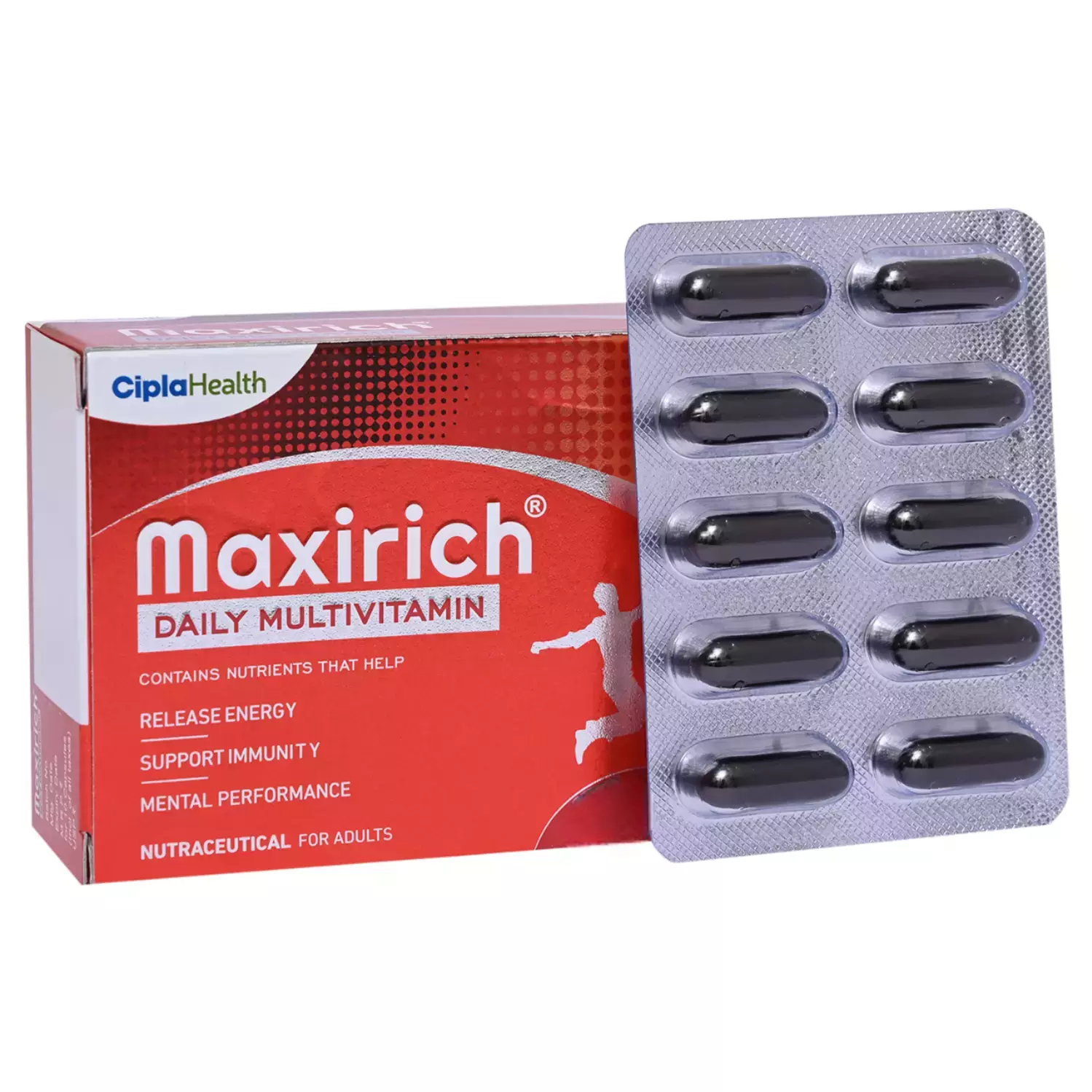Maxirich
| Package | Per capsule | Savings | Price |
|---|---|---|---|
| 180 capsules | $0.23 | $13 | $54 $41 |
| 150 capsules | $0.23 | $10 | $45 $35 |
| 120 capsules | $0.24 | $7 | $36 $29 |
| 90 capsules | $0.26 | $4 | $27 $23 |
| 60 capsules | $0.27 | $2 | $18 $16 |
| 30 capsules | $0.30 | – | $9 |
What is this medicine?
MAXIRICH Capsule is a multivitamin and multimineral supplement. It is commonly used to help improve overall health and wellness, boost energy levels, support immune function, and correct vitamin and mineral deficiencies. It is often recommended in cases of fatigue, nutritional deficiency, or during recovery from illness.
What should I tell my health care provider before I take this medicine?
They need to know if you have any of these conditions:
-
liver disease
-
kidney disease
-
iron overload (hemochromatosis)
-
bleeding disorders
-
history of kidney stones
-
any malabsorption syndrome
-
if you are taking other supplements or fortified foods
-
an unusual or allergic reaction to any of the ingredients in Maxirich (such as vitamin A, B-complex, C, D3, E, iron, zinc, etc.), food dyes, preservatives, or other vitamins
-
pregnant or trying to get pregnant
-
breast-feeding
How should I use this medicine?
Take this medicine by mouth with a glass of water, preferably after a meal to avoid stomach upset. Follow the instructions provided on the label or by your health care provider.
Do not take more than the recommended dose unless advised by your doctor.
Overdosage: Taking too much of certain vitamins (especially fat-soluble vitamins like A, D, E, and K) or minerals like iron can be harmful. If you think you have taken too much, contact a poison control center or emergency room at once.
What if I miss a dose?
If you miss a dose, take it as soon as you remember. If it is almost time for your next dose, skip the missed dose and return to your regular schedule. Do not take double or extra doses.
What may interact with this medicine?
-
other multivitamins or supplements (risk of overdose)
-
antacids containing aluminum or magnesium
-
certain antibiotics (e.g., tetracycline, ciprofloxacin — may interfere with absorption)
-
diuretics
-
iron supplements or products containing calcium or magnesium
-
thyroid medications (e.g., levothyroxine)
This list may not describe all possible interactions. Provide your health care provider with a list of all the medicines, herbs, non-prescription drugs, or dietary supplements you use.
What should I watch for while using this medicine?
-
Inform your doctor if you are undergoing any lab tests — some vitamins and minerals can interfere with test results.
-
Do not take additional vitamin or mineral supplements unless recommended.
-
Avoid excessive alcohol consumption while on supplements — it may reduce absorption or effectiveness.
-
If symptoms of fatigue, weakness, or deficiency persist, consult your doctor.
Pregnant or breastfeeding women should use this only if prescribed, as certain vitamins (like vitamin A in high doses) may be harmful during pregnancy.
What side effects may I notice from this medicine?
Side effects that you should report to your doctor or health care professional as soon as possible:
-
allergic reactions like skin rash, itching, or swelling
-
severe dizziness or difficulty breathing
-
signs of iron overdose (nausea, vomiting, stomach pain, or black/tarry stools)
Side effects that usually do not require medical attention (report if persistent or bothersome):
-
upset stomach
-
constipation
-
mild diarrhea
-
metallic taste in the mouth
-
yellowing of urine (usually due to vitamin B2, riboflavin — harmless)
This list may not describe all possible side effects.
Where should I keep my medicine?
Keep out of the reach of children. Accidental overdose of iron-containing products is a leading cause of fatal poisoning in children under 6.
Store in a cool, dry place below 25°C (77°F). Protect from moisture and direct sunlight.
Do not use after the expiration date. Dispose of any unused medicine properly.
























